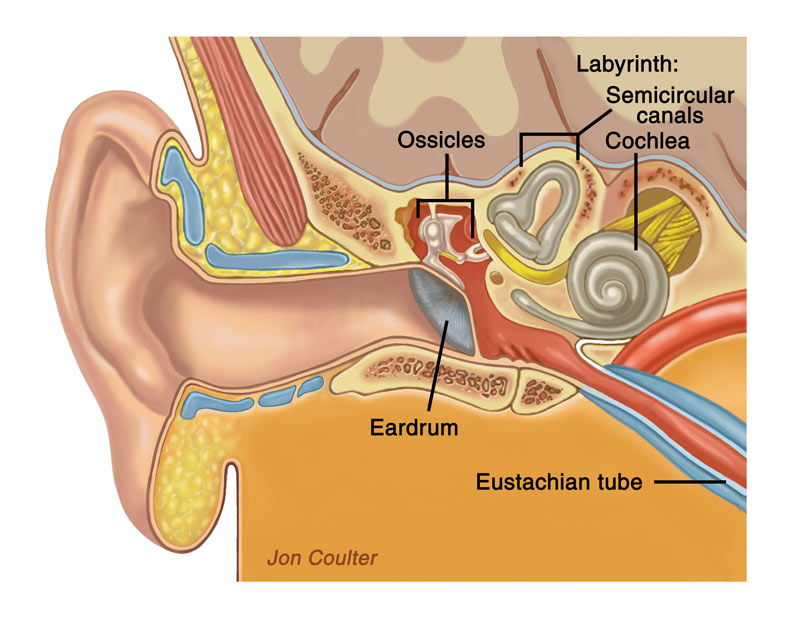
What is Ménière’s disease? Ménière’s symptoms
Menieres disease describes a set of episodic symptoms including:
- Vertigo (attacks of a spinning sensation)
- Hearing loss
- Tinnitus (a roaring, buzzing, or ringing sound in the ear)
- A sensation of fullness in the affected ear
- Nausea and vomiting
Other clinical features of Ménière’s Disease
- Episodes typically last from 20 minutes up to 4 hours
- Hearing loss is often intermittent, occurring mainly at the time of the attacks of vertigo
- Loud sounds may seem distorted and cause discomfort
- Usually, the hearing loss involves mainly the lower pitches, but over time this often affects tones of all pitches
- After months or years of the disease, hearing loss often becomes permanent
- Tinnitus and fullness of the ear may come and go with changes in hearing, occur during or just before attacks, or be constant
Is Ménière’s disease common?
Menieres disease is one of the most common causes of dizziness originating in the inner ear. In most cases only one ear is involved, but both ears may be affected in about 15 % of patients. Ménière’s disease typically starts between the ages of 20 and 50 years. Men and women are affected in equal numbers. Because Ménière’s disease affects each person differently, your doctor will suggest strategies to help reduce your symptoms and will help you choose the treatment that is best for you.
What causes Ménière’s disease?
Menieres disease probably results from an abnormality in the volume of fluid in the inner ear. Too much fluid may accumulate either due to excess production or inadequate absorption. In some people, especially those with involvement of both ears, allergies or autoimmune disorders may play a role in producing Ménière’s disease. In some cases, other conditions may cause symptoms similar to those of Ménière’s disease.
People with Ménière’s disease have a “sick” inner ear and are more sensitive to factors, such as fatigue and stress, that may influence the frequency of attacks. Your doctor will take a history of the frequency, duration, severity, and character of your attacks, the duration of hearing loss or whether it has been changing, and whether you have had tinnitus or fullness in either or both ears. When the history has been completed, diagnostic tests will check your hearing and balance functions.
Tests for Ménière’s disease
Hearing testing
- A hearing test typically indicates a sensory type of hearing loss in the affected ear
- Speech discrimination (the patient’s ability to distinguish between words like “sit” and “fit”) is often diminished in the affected ear
Balance testing
- An ENG (electronystagmogram) may be performed to evaluate balance function
- In a darkened room, eye movements are recorded as warm and cool water or air are gently introduced into each ear canal
- Since the eyes and ears work in coordination through the nervous system, measurement of eye movements can be used to test the balance system – in about 50 percent of patients, the balance function is reduced in the affected ear
- Rotational or balance platform testing, may also be performed to evaluate the balance system
Electrocochleography
- Electrocochleography (ECoG) may indicate increased inner ear fluid pressure in some cases of Ménière’s disease
- The auditory brain stem response (ABR), a computerized test of the hearing nerves and brain pathways
Imaging
- Magnetic resonance imaging (MRI) may be needed to rule out a tumor occurring on the hearing and balance nerve – such tumors are rare, but they can cause symptoms similar to Ménière’s disease
Remedies for Ménière’s disease
- Avoid stress and excess salt ingestion, caffeine, smoking, and alcohol
- Get regular sleep and eat properly
- Remain physically active, but avoid excessive fatigue
- Low sodium diet
- Diuretic medication (water pill)
- Anti-vertigo medications
- Intratympanic injection with either gentamicin or dexamethasone.
- Surgery
Treatment summary
In many people, careful control of salt in the diet and the use of diuretics can control symptoms well. Surgery is needed in only a small minority of patients with Meniere’s disease if vertigo attacks are not controlled by conservative measures and are disabling. Your ENT Specialist will help you choose the treatment that is best for you, as each has advantages and drawbacks. Consult your ENT Specialist about other treatment options. Although there is no cure for Ménière’s disease, the attacks of vertigo can be controlled in many cases.



